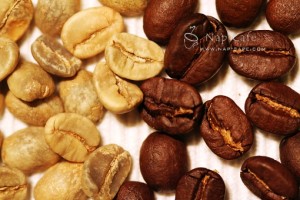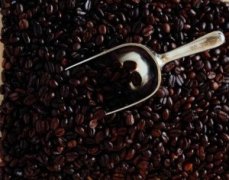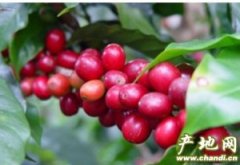Central American Puerto Rico San Pedro Manor Coffee beans

Puerto Rico San Pedro Estate Coffee Beans
Puerto Rico's new crop coffee is a mild, supple, well-balanced island bean with an attractive single-malt sweet dry aroma, extremely sweet in the cup, and a medium toasted creamy and greasy texture that is often appropriate for Puerto Rico island beans.
The history of coffee in the Caribbean Sea is closely related to the Spanish name transfer. Coffee in various places was not so important in the 18th century. The most important work was to grow sugar crops in fertile valley land. In the early 19th century (1800), the residents of Coscia Island in the French Mediterranean migrated to Puerto Rico. Because the valley land had been occupied by Spanish immigrants, they chose to settle in the southwest mountains of the island. Most of them were near Yuco City. Because of their hard work and determination, coffee cultivation brought them good returns. They dominated the island's coffee industry in the 1860s. At that time, Puerto Rico's coffee bean production was the sixth highest in the world. Those Corsican immigrants planted coffee trees in the highlands. The fruit was regarded as selected.(Yauco Selecto) The origin of coffee beans also mainly dates back to this period. However, two severe hurricanes hit Puerto Rico in 1898. These two hurricanes destroyed the local coffee industry. Farmers had to wait two years for the crop to return to normal. During this period, the United States was very interested in sugar production in Puerto Rico. In addition, European countries no longer regarded Puerto Rico coffee beans as crops produced in their colonies and imposed tariffs. It hit Puerto Rico coffee hard.
Caribbean Sea is a warm, romantic and mysterious sea area. Many good coffees also surround this ring sea area. Jamaica Blue Mountain, Dominican Republic, Cuba Crystal Mountain, Puerto Rico Yuco, etc. These are the most famous rare and expensive coffees in the world. These island beans make people have a light milk fragrance and elegant flower fragrance. The acid is delicate and soft. Although it is still difficult to avoid the problem that coffee is easy to lose moisture due to the sultry island climate, the overall texture is the first-class beans in coffee. Puerto Rico coffee is not easy to buy in the market mainly because of the low yield and most exports to Europe, coupled with the adverse effects of severe weather and hurricane damage on coffee crops, there will be no coffee to buy that year.
Coffee trees were introduced to Puerto Rico from Martinique in 1736. Early coffee was mostly grown by immigrants from Corsica. By 1896, Puerto Rico was the sixth largest coffee exporter in the world, with most going to France, Italy, Spain and Cuba. Coffee plantations flourished in the 19th century, but the rise of sugar cane and drug cultivation, as well as the impact of hurricanes and war, have left the coffee industry behind and are now recovering.
Today, Puerto Rico gourmet coffee is exported to the United States, France and Japan. Coffee in this country is generally carefully cultivated, pure taste, aroma, heavy particles, of which the best is among the world's famous brands. The best coffee is Yallco Selecto, which means "select." Grand Lares Yauco is grown in the southwestern part of the island, and Lares coffee is grown in the south-central part.
Grown only on three farms in the south-west of the island, Yocote Coffee has a strong aroma and a long aftertaste. This coffee sells at a high price and its aroma rivals that of any other coffee variety in the world. In the Yauco region, the coffee is owned and operated by local planters. The mountain climate here is mild, the plants have a long maturity period (from October to February of the following year), and the soil is high-quality clay. Some older varieties of Arabica coffee are grown here, although their yields are lower than those of other varieties, but they are generally of high quality. The people here have been adopting an ecologically conservative, intensive farming method, using only low-toxicity fertilizers and chemicals, and adopting mixed crop cultivation measures to make the soil more fertile. When it came time to pick the beans, people walked back and forth between the trees, picking only the fully ripe beans, which were then washed in a roller for 48 hours.
Yocote Select beans are kept in their shells until they are shipped, and the skins are not removed until the order is shipped to ensure optimum freshness. U.S. government officials, such as the FDA and USDA, are also present at the time of shipment submission, and their job is to monitor compliance with federal regulations. There are also staff from local evaluation committees who take samples of one bag out of every 50 bags and qualify them using international gauges.
Jaime Fortuno, president of the agency Escogido Yauco, silently watches all this work every year, down to the tiniest detail. Fortuno is an investment banker who graduated from Harvard Business School. He was determined to seize every opportunity to open up a market for premium coffee in Puerto Rico. He expects a maximum annual production of 3000 bags of 45 kilograms each, which is less than 1 percent of the island's total coffee production.
Yocote Choice is a mesmerizing coffee that is full of flavor, bitter, nutritious, fruity and worth tasting. Even Taylors in Harrogate, England, imported 50 bags of Yocote Choice coffee.
Puerto Rico and Puerto Rico Yuco Selecto are different. Yuco Selecto is Manor Bean, a brand jointly launched by San Pedro, Caracolillo and La Juanita in Puerto Rico.
Flavor: Full grain, full flavor, rich aroma
Recommended baking method: medium baking
Puerto Rico Coffee-King's Coffee
Puerto Rico, a small country in South America, is composed of a series of scattered islands. Each season is like spring. Flowers and plants are abundant. Like a bead chain scattered by God, you can see the brilliance of heaven with a slight rotation. The main island of Puerto Rico, only 8959 square kilometers, is a small point on the map, but it is like an enlarged bonsai. There are many mountains and hills on the island. The coastal area around Beishan is a lowland plain. Although many natural forests have been cut down to be cultivated, fortunately, the famous cloud-covered rainforest in the northeast has been protected as a national park.
The island carries a South American flavor that cannot be melted: hot, direct, intense, vibrant. The Atlantic Ocean in the north and the Caribbean Sea in the south brought them abundant rainfall and cool air. Together with the unique sunshine of the tropics, they gave birth to a group of dense rainforests and various animals. There were world-famous cloud-covered rainforests here. When you walked in, you would be surrounded by thick water vapor. Tall trees covered the sky with only a few thin lines. The leaves of every plant were so green that they seemed to drip into the water. And the flowers were especially large and pungent compared with the rest, bright purple, red, yellow, orange: all brilliant colors, pure as sunlight and sea water, not a little gray, and exhilarating to see. Small animals often leap up the treetops in front of us, and the lush trees often block the birds 'shadows, so that people can only hear the distant and near chirps. A school of vigorous vitality will be filled with people's mood, even if a person through the forest, loneliness and sadness also have no place.
It's on islands like this that the best coffee in the world is grown. In particular, Puerto Rico Yocote selected coffee by Puerto Rico well-known estate to enrich coffee planting experience and inheritance, cultivated this top-class coffee. It has a special rich flavor, such as cigar-tobacco-like incense smell, wild and unrestrained with sweet taste revealed. For many years, it has been loved by European royal families and nobles, and it is designated as the royal coffee for the Holy See. It is recognized by international coffee critics as the world's third largest coffee.
Important Notice :
前街咖啡 FrontStreet Coffee has moved to new addredd:
FrontStreet Coffee Address: 315,Donghua East Road,GuangZhou
Tel:020 38364473
- Prev

Ecuadorian coffee beans from South America
Coffee origin: the Ecuadorian Arabian Coffee Tree was first introduced to Ecuador (Ecuador) in 1952 and its coffee quality is very good, especially the coffee harvested in early June. Ecuadorian coffee beans can be divided into two varieties: Galapagos and Gigante, both of which have the characteristics of large granules and heavy weight. Ecuadorian coffee can be divided into first class (No.1) and special coffee according to quality.
- Next

American and Brazilian coffee beans, where fine coffee is produced.
Brazilian coffee beans generally refer to coffee produced in Brazil. There is a wide variety of Brazilian coffee, the vast majority of which are unwashed and sun-dried, classified according to the name of the state of origin and the port of transport. Brazil has 21 states and 17 states produce coffee, but four of them produce the largest, accounting for 98% of the country's total output. Brazilian coffee has a low sour taste.
Related
- Guji coffee producing area of Guji, Ethiopia: Humbela, Shakiso, Wulaga
- What is the most expensive variety of Qiloso in BOP multi-variety group?
- How to store the coffee beans bought home?
- Why are Yemeni coffee beans so rare now?
- Ethiopian Sidamo all Red Fruit Sun Sun Santa Vini Coffee beans
- SOE is mostly sour? What does it mean? Is it a single bean? what's the difference between it and Italian blending?
- Is Italian coffee beans suitable for making hand-brewed coffee?
- How to choose coffee beans when making cold coffee? What kind of coffee beans are suitable for making cold coffee?
- Just entered the pit to make coffee, what kind of coffee beans should be chosen?
- Can only Japan buy real Blue Mountain Coffee? What are authentic Jamaican Blue Mountain coffee beans?

